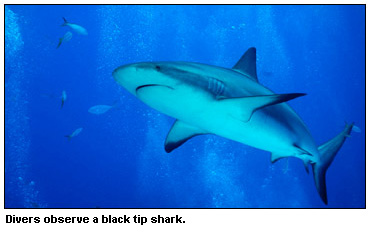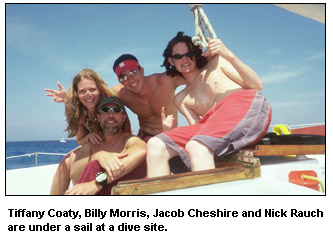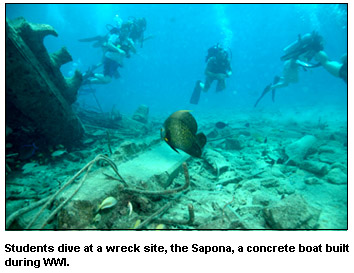Mystery of the depths revealed
Spending a week in the Bahamas not
a bad way to earn college credits
By Jason Trask
jtras00@highlands.edu
Staff Writer
Who goes to class and swims with sharks?
 This past May, 13 Georgia Highlands College students traveled to the Bahamas to SCUBA dive, study basic principles of physical science, and earn six credit hours while doing so.
This past May, 13 Georgia Highlands College students traveled to the Bahamas to SCUBA dive, study basic principles of physical science, and earn six credit hours while doing so.
This was the college�s first study abroad trip to the Bahamas.
Assistant professor Mark Pergrem and assistant professor William Morris led the group of GHC students on the seven-day, six-night adventure to the Bahamas.
Prior to the trip, everyone met for four full days of instruction in basic SCUBA certification. During these pre-trip classes, the participants also covered a variety of topics within physical science, including the physics of fluids, oceanic and atmospheric circulation patterns and the marine ecosystem.
 These students spent their seven days in the Bahamas aboard a 65-foot sailboat named Pirate�s Lady. The Pirate�s Lady is capable of carrying 22 passengers and six crew.
These students spent their seven days in the Bahamas aboard a 65-foot sailboat named Pirate�s Lady. The Pirate�s Lady is capable of carrying 22 passengers and six crew.
Pergrem and Morris agreed the outing to the Shark Research Station was the students� favorite part of the trip. During their trip to the research station students were treated to a shark dive. With the divers in a circle, a chum-cicle, which is frozen shark bait, was placed at the center of the group. Dozens of sharks were swimming and eating in close proximity to the divers.
Though the trip sounds wonderful, it was not a vacation. The six hours of credit for the trip were derived from two classes. Students received two hours of PE credit (PHED 1450 Basic SCUBA) and four hours of science credit (PHSC 1012 Physical Science II). Students were able to complete all necessary dives to become certified SCUBA divers. The normal basic SCUBA course offered by GHC does not include the open water dives, which are required to become a certified diver.
 Do not be alarmed, though. The trip was not all work without any downtime. Pergrem said that they made port twice during the week and that on these nights students were afforded some freedom to explore the local community on their own.
Do not be alarmed, though. The trip was not all work without any downtime. Pergrem said that they made port twice during the week and that on these nights students were afforded some freedom to explore the local community on their own.
The total cost for this trip was around $2,000. This included tuition, room and board, SCUBA certification and miscellaneous fees and equipment costs.
Students who are interested in attending future study abroad trips to the Bahamas may contact either Pergrem or Morris at dpergrem@highlands.edu or bmorris@highlands.edu.
All photos contributed by Mark Pergrem
|